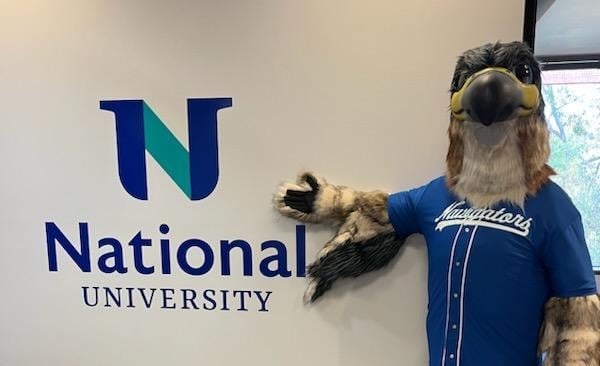You have /5 articles left.
Sign up for a free account or log in.

Students will get their first look at Navi, pictured here, at this weekend’s graduation ceremony in San Diego.
National University
Like many predominantly online universities, National University serves large numbers of parents, full-time workers and members of the military—people who are used to the challenge of managing different roles and responsibilities.
That skill for balancing life’s demands inspired the name and identity of the university’s new mascot: a peregrine falcon named Navi. University officials said they chose the raptor for its strong navigational skills, as well as for its status as the fastest predator on Earth. Going forward, NU’s 41,000 students, who have never before had a mascot, will be known as the Navigators.
Navi is the basis of a new brand image for the university, which includes a blue-and-teal falcon head logo. And though the university has no football team or giant stadium where a traditional university mascot would dance, cheer and interact with fans, Navi will appear at NU’s in-person graduation ceremonies, starting this weekend when the Class of 2023 will receive their diplomas at San Diego’s Petco Park. Over two days of celebration, a total of 33,000 people are expected to gather to celebrate 6,300 graduates.
“Navi the Navigator is part of our culture now,” said Mark Milliron, the university’s president.
Colleges are increasingly focused on creating a sense of community on campus, partially in response to ongoing student mental health crises. Even when students’ mental health deteriorated during the forced isolation of the COVID-19 pandemic, fostering a sense of belonging seemed to help, decreasing depression and anxiety. But figuring out how, exactly, to build community has been a challenge even for universities that have a physical campus and residential population to work with; it’s even more difficult for online universities with massive student bodies scattered across the globe.
But that hasn’t stopped them from trying. Developing that sense of belonging for NU students has been a priority for Milliron, who arrived at the university last October. It’s apparently important to NU’s students, too; in an annual survey known as the Adult Student Priorities Survey, they rated the importance of belonging six out of a possible seven.
Much about NU’s structure is designed to accommodate the needs of nontraditional students. For instance, the university offers four- and eight-week courses, which Milliron said can be easier for adult learners with other obligations to manage than taking multiple 16-week courses at a time. Many of NU’s students have faced difficulties adapting to the format of traditional universities, which are typically designed for undergraduates fresh out of high school, Milliron said.
“This is a built-for-purpose university for working students,” he said. “In many other contexts, they feel like they’re a second thought. We’re built for this kind of student, and we want them to identify and belong [here].”
To him, the Navigator mascot serves as a symbol of those efforts.
“The idea of the Navigator gives them another thing, symbolically, to connect with,” he said.
Community Building On- and Off-Line
NU is not the first primarily online institution to introduce a mascot—or even the first to draw comparisons between its student body and a bird of prey. Western Governors University, which is headquartered in Utah and serves about 145,000 students, rolled out its night owl mascot, Sage, in 2011. The university settled on that particular icon because many WGU students take classes and study at night; students chose the name, a synonym for “wise,” in a social media poll.
Debbie Fowler, WGU’s senior vice president of student success, said that the moniker brings WGU’s community together in a number of ways—including by allowing administrators to address the whole student body as “night owls” in institutional communications.
Sage is also a favorite of children who attend graduation ceremonies—which is important to the many parents who study at WGU.
“We emphasize that this is a family commitment and a family celebration when a family member progresses in their degree,” Fowler said.
She noted that many of WGU’s efforts to instill school spirit grew out of student and alumni suggestions. The institution doesn’t technically have a school song, for example, but a graduation speaker one year decided to give his address in the form of a song. After that, the university began to play it at commencement, creating a new campus tradition.
At the University of Maryland Global Campus, which does not have a mascot, many of the biggest community-building efforts have come from the alumni association, according to Shelley Hintz, director of student engagement. In recent years, the association started holding in-person homecoming celebrations. This past year, it also launched a campaign to encourage students and alumni to complete community service during April, which included an in-person park cleanup in Maryland; the alumni association also collected data on community service completed by students around the world, sending prizes to those who reported their participation.
“Being able to participate in various universitywide events, I think, is very important,” Hintz said. “In general, I think it gives them a sense of community and belonging regardless of where they are.”
School Spirit Skeptics
Online learners vary in their level of enthusiasm about efforts to cultivate school spirit. Amanda Lien, a brand strategist who graduated from NU’s creative writing master’s program last year, said that as a graduate student and working professional, she didn’t feel a strong attachment to the university.
“A lot of us were working professionals and in the military when we were in our graduate programs, so we were probably not the target audience for school spirit–related stuff,” she said. “An overwhelming amount of my classmates were in the military; that was how they identified. I was a working professional and would tend to align myself more with that than my university.”
She lauded her professors for making sure she felt a sense of community in her creative writing classes, however, where it was especially important because she and her classmates had to critique each other’s work—even though they only had a few short weeks to get to know each other.
Stephanie Clark, a full-time teacher and parent of two who has earned two credentials and a master’s degree at NU, echoed Lien’s sentiments in a Facebook message to Inside Higher Ed.
“Based on my experience, many students who choose this type of school/program have certain life circumstances that interfere with traditional schooling,” she said. “To put it blatantly, school spirit doesn’t matter. Can I get what I need while still maintaining my life?”
But, Lien noted, it varies by person. For students who do seek out that sense of school spirit—or who can enjoy the antics of a grinning peregrine mascot even if they don’t feel like it adds to their college experience—Navi is likely to bring something special to this year’s graduation.




